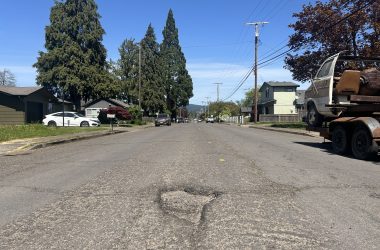The statistics about food waste are genuinely staggering. Here are a few that always stick out to me.
Between 30 to 40 % of food grown in the U.S. goes uneaten, and wasted food makes up nearly 20 % of Lane County’s garbage stream.
• In Oregon, a family of four can save an average of nearly $2,000 annually by eating all the food they buy.
• In the U.S., one in five people lacks consistent access to nutritious food, while up to 3 million tons of wasted food goes to landfills annually.
• Reducing food waste is one of the most powerful personal actions to reduce greenhouse gas emissions.
So, food waste is not great.
What is great is that we can all do more to address the issue in a way that’s good for the planet and our wallets. To illustrate the point, I’ve pulled a few tips from our Waste Wise Lane County website, EatSmartWasteLess.tips. I encourage you to visit the website for more information.
Shop intentionally
When you go to the store, go with a plan. Take inventory of ingredients you might already have in your refrigerator and pantry, and then stick to the script. Eating before going to the store also helps curb unplanned detours.
Keep your food happy at home
Food storage is an art form and a science. It can be tricky. Certain produce should be refrigerated, while others shouldn’t. Some produce plays well together; others seem mortal enemies and should be separated. Then there’s the layout of the fridge. Should your milk go on the door or a shelf? How about fish or chicken? Visit EatSmartWasteLess.tips to download an info sheet about best refrigerator practices.

Leftovers are your friend
I know many people who don’t like leftovers. That’s a bummer because reimagining what you can do with leftovers is a lot of fun.
In her book The Everlasting Meal: Cooking with Economy, Tamar Adler describes the joy she derives from recreating meal after meal with her leftovers.
“Meals’ ingredients must be allowed to topple into one another like dominoes,” Adler writes. I couldn’t agree more. With just a little planning and imagination, leftovers can pop.
Plus, many meals, such as stews and soups, taste better with age. Eating what you already have doesn’t hurt your bank account, either.
Curbside composting in Eugene, Springfield, and Veneta
Finally, there’s food scraps.
Composting is a far better option for discarding unused food bits than throwing them in the trash. Anytime you can avoid putting food in a landfill, it’s a huge win for the climate, as food waste creates extremely potent methane gas.
And even better: if you have a curbside yard debris bin and live in the city limits of Eugene, Springfield, or Veneta, you can place your food scraps — including meat and bones — into your yard waste bin for pickup. Yep, you heard that right.
And if you don’t live in one of those cities, you can compost at home (minus the meat).
Happy eating.
Waste Wise Tip: Put odor on ice
Are you worried about pests and odors? Freeze food scraps in a plastic bag and empty them into the yard waste bin just before pickup.
Food Waste Trivia
Take a few minutes to test your knowledge of wasted food and take our challenging trivia quiz. Simply scan the QR code with your smartphone, “spin the wheel” to choose a nickname, and play the game.

Waste Wise Lane County, a part of the Lane County Waste Management Division, seeks to empower residents, businesses, and schools with resources to reduce waste and live sustainably. Sign up for the Waste Wise newsletter at lanecountyor.gov/wastewise.
Daniel Hiestand is the Lane County Waste Reduction Outreach Coordinator and a monthly columnist for The Chronicle.







